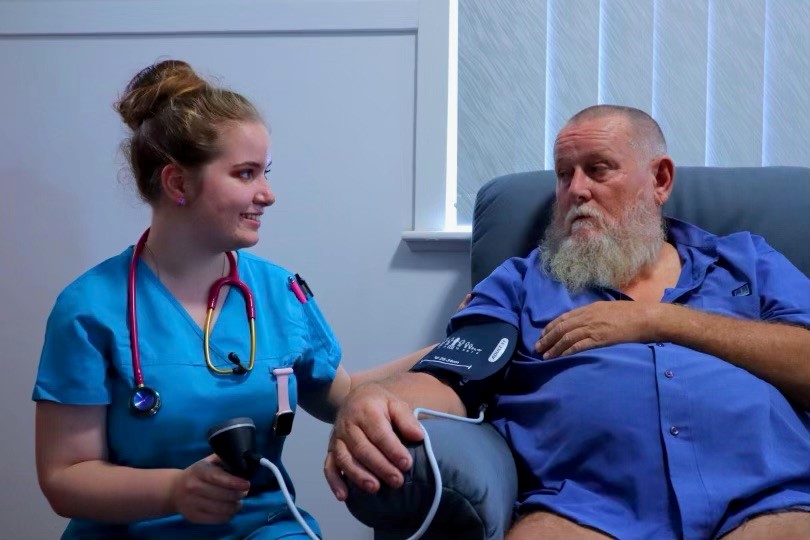Georgina in action
If you ever get the opportunity to give General Practice (GP) nursing a go, as a placement student or a paid employee, I would highly recommend this valuable experience. As a third-year student nurse, I spent eight months of my final year employed as a Medical Assistant (Student Nurse) at a large, local medical centre. My role was multi-faceted, ranging from patient care duties (similar to that of an Assistant in Nursing, or AIN) to reception, patient screening and assisting eligible patients to access Chronic Disease Management Plans. I loved my work in the role and my time at the medical centre gave me the confidence I needed to pursue a career in rural and remote nursing.
I would like to draw on this experience to share with you five opportunities available to those who placement and/or work as a GP nurse during their studies.
- Get a crash course in a little bit of everything
Not sure what you love yet? By the end of a placement in a GP you will! Between wound care, chronic disease management, minor trauma, the occasional emergency, minor surgery, mental health nursing and health assessment across a population of patients spanning from geriatrics to paediatrics you will quickly learn what you like and what might not be for you!
- Improved communication skills – especially with doctors
As a student, discussing patient concerns with a doctor or more senior nurse can be intimidating. When I first started in a GP, I felt very awkward calling doctors to come and assess patients or to clarify an order. Did I feel like this by the end of my eight months? Not at all! As with any skill, practise makes perfect and the revolving door of patients and doctors through the treatment room means that you will become very well versed in ISBAR, AIDET and SOAPIER.
- Gain a better understanding of the Australian health care model
Before I worked in a GP, my understanding of the Australian health care model was minimal to say the least (and even after eight months it is a confusing and complex world to navigate!). Working in a GP will help you to understand what patients can access once they leave their hospital bed and re-enter the community, as well as observe where the gaps in care are. You will also gain a better understanding of Medicare billing, patient entitlements, workers compensation and government health initiatives.
One of the challenges I often saw was the disconnect between what a patient needed and what services were available to them through Medicare once they were discharged, which greatly highlighted the spaces in which inequities can and do occur. If you ever want to learn how to use a medical product in a multitude of ways, ask a GP nurse!
- Learn a wide variety of skills
GP nurses wear a lot of different hats and learn the skills to go along with them. Immunisations, single slab plastering, suturing, ear syringing, and much more on top of general nursing skills. If you want to learn something new that you might not get to elsewhere, GP nursing might just be the perfect place for you!
- See nursing from a different angle
In nursing, it is not often that the majority of our patients are healthy. In my undergrad degree, there was a lot of emphasis on hospital and post-admission community nursing focusing on how we look after patients during and after hospital stays. It was only once I worked in a GP that I learned how nurses keep our patients out of hospital – whether that be by encouraging elderly patients to get vaccinated, providing long term wound care or assessing deterioration in their health by providing annual screening and check-up services.
Additionally, GP nursing is one of the few settings in which you can really see the long-term impact that health care has on a patient and the limitations that health needs such as daily wound dressings or regular depot injections place on people’s lives – something which will serve you well in any context you practice in.
So, if you are a nursing student preparing to go on placement this year, consider requesting a GP setting and if you are allocated one, be open to it! I promise it will make you a better nurse than you would have been without it.
By Georgina Rudken MACN





